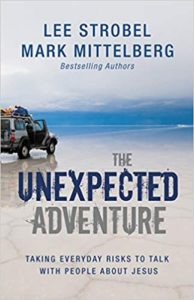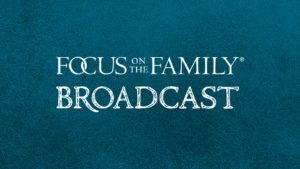Preview
Lee Strobel: I mean, is there someone you love but you’ve kind of given up on ’em? Is there someone you love whose eternity that you are desperately concerned about, but you’re not, you’re not following that up with prayer?
End of Preview
John Fuller: Today on Focus on the Family with Jim Daly, Pastor Lee Strobel will encourage you to continue praying for your friends and family members who don’t know the Lord. Thanks for joining us. I’m John Fuller.
Jim Daly: John, I believe that as Christians, one of the most painful things we experience is knowing that some of the people we love do not have a relationship with Jesus Christ. And it seems like the more we talk about the benefits of being a Christian, the more closed off they become, uh, even Jesus experienced this. In the Gospel of Mark Jesus said, “A prophet is honored everywhere except in his own hometown and among his relatives and his own family.” That’s straight from the New Living Translation. Uh, today, Pastor Lee Strobel will share with us the importance of praying for that loved one. And who knows, God might put someone else in their life, someone who might be the one to lead them to Christ. And that’s fine if it gets the job done.
John: Yeah, whatever it takes. And, uh, Lee Strobel is a bestselling author. He’s been on this broadcast a number of times. Here he is now speaking at Woodlands Church in the Houston area on today’s episode of Focus on the Family.
Lee: Well, we’re in the second week of a little series called, If Jesus Lived in My House. And I wanna suggest that if Jesus physically lived with us in our house, one of the things we would notice is that He would pray and He would pray specifically and fervently and continually and faithfully and expectantly for spiritually confused people all over the village, all over town, all over the neighborhood. He would pray for the salvation of spiritually lost people. James 5:16 says this, “The earnest prayer of a righteous person has great power and produces wonderful results.” And I’ve seen this for myself time after time, how God answers prayer in totally unexpected ways. Now, I, I do understand when we’re praying for people who are spiritually confused and we’re praying that they’ll come to faith in Jesus Christ, that our prayers cannot force them against their will to bend their knee to Jesus.
People have free will. They have the choice each of us to make whether or not we’re gonna follow Christ or not. So I don’t think our prayers can force someone to make that decision. But I do believe James, when he says the prayers of a righteous person make a difference, they make a difference. I like the way Mother Theresa put it. She said, “When I pray, coincidences happen, and when I stop, they don’t.” The prayers that we offer for spiritually confused people are powerful and they’re incredible in their power. I think of the story of a woman named Amelia, uh, in England in the year 1849. Her 17-year-old son was spiritually wandering. He kinda walked away from his Christian faith. Maybe you know someone, maybe you have a child or a grandchild who’s, who’s going through that experience.
And so she was, as a mom, obviously quite concerned about the eternity of her son. And she was, um, had to go out of town on a long trip. And so she left on that trip. And while she was on that trip, she felt a, a great compulsion to pray for her son. And I don’t mean just throw a casual prayer up to heaven. I mean, she went off by herself and she prayed and she prayed and she prayed for hours and hours and hours for the soul of her son until she felt God in her soul, confirming he had heard the prayer, he was gonna take action. And at the same moment that she was praying back there miles away at their home, her son was reading a book. And in that book it talked about how Jesus’ death on the cross paid the price for all of the sin of humanity. And the words that jumped out of Him were words on the cross where He says, “It is finished. It is finished. The payment is made for the sins of the world.”
And so this young man said to him, “Well, okay, well if it is finished, then what’s there left to do?” And he realized the one thing left to do was for him to receive this forgiveness of Christ, for him to personally receive Jesus as his forgiver and as his leader. He thought of John 1:12, “But as many as received Him, to them He gave the right to become children of God, even to those who believe in His name.” He had to receive. So he got on his knees and in a prayer of repentance and faith, he received Jesus Christ as his Lord and Savior. And so a couple, uh, weeks later, his mother returns home and she opens the front door of the home to come in and he sees her and he runs over to her and he wants to tell her the good news. But she says to him, “Son, I already know. I already know.”
Well, that young man’s name was James Hudson Taylor. And James Hudson Taylor turned out to be one of history’s greatest missionaries. He spent 51 years in China. He learned the language, he learned the customs. He traveled all over China, founding schools, founding churches, bringing people to faith in Christ. One historian said this, “More than any other human being, he made the greatest contribution to the cause of world Mission in the 19th century. And people today in China and elsewhere are coming to faith because of the seeds planted through God in the life of Hudson Taylor.” And by the way, when Hudson Taylor was elderly and he could no longer get outta bed, he was bedridden, you know what he did? He had a, a map of China put on the wall next to his bed with pins stuck in it of the major population centers ’cause he wanted to continue to pray specifically for those cities even though he was too ill to get up and do anything else.
So what I wanna ask us is what supernatural chain of events might your prayers trigger? Just as a, a loving mother’s prayers for her son started a movement through Hudson Taylor that continues to echo today. What supernatural chain might your prayers initiate? We need God’s help for this. This is a spiritual battle. CS Lewis said, “There is no neutral ground in the universe.” Every square inch, every split second is claimed by God and counterclaimed by Satan. This is a spiritual battle. Ultimately it’s not our clever gospel illustrations, it’s not our apologetic answers or evidence that we offer. Ultimately, what brings people of faith in Jesus Christ is the Holy Spirit convicting people of their sin and drawing them into the kingdom of God.
But the Holy Spirit can and does use us in the process and our prayers, I believe make a difference in the process. So what I’d like you to do, I wanna take you through a little exercise. I wanna think through five areas of influence that you have. We all have a number of acquaintances and buddies and relationships and so forth. I’m gonna walk you through five categories and I want you to think in each of these categories of the people you know, who you’re pretty sure are not followers of Christ, I want you to kind of bring their faces to your mind. So the first sphere of influence are your friends, people you play golf with, people you, uh, see at the club, people you, uh, play tennis with, um, maybe people you haven’t seen in a while from high school, they’re in your, in, in contact through Facebook.
Think of all the friends who you know, bring the picture of them to your mind if you’re pretty sure that they’re spiritually confused, they don’t know Jesus. Second, our family, our family, our nephews and nieces and uncles and aunts and, and, and, and kids and grandkids and moms and dads and so forth. Who in your extended family are you pretty sure is not safely in the kingdom of God? Bring their face to your mind. And then our workplace, whether it’s an office or a job site or whatever, think of your coworkers, think of your colleagues. Um, who among them are you pretty sure is not a believer? And then your neighborhood. Who among your neighbors do you know that you’re pretty sure are not spiritually saved? And then your school, you know, some of you are getting a graduate degree, you go to school part-time or you’re in college or high school or whatever.
Think of your classmates, think of the administrators. Think of the principles and so, who are you pretty sure does not know Christ? Picture all of those people. Then let me ask you this question. If Jesus physically lived in your house and tonight He knocked on the door of your bedroom and, and He walks in and He says, “You know what? I am gonna answer every single prayer that you prayed last week.” If He were to say that to you tonight, would there be anybody new in the kingdom of God tomorrow? Would any of those faces that came into your mind be in God’s kingdom tomorrow? Are we praying? There are half a dozen reasons. I’m gonna give you five reasons why we pray for other people. Number one, because Jesus modeled it. Jesus modeled it.
You know, many translations, I don’t know which translation you have in your Bible. Um, many translations, uh, when they talk about the crucifixion of Jesus in Luke 23:34, translate the verse this way. “But Jesus said, father, forgive them for they do not know what they’re doing.” But the imperfect tense of the Greek there, I think is a little more nuanced than that. And I think the New American Standard Bible does the best of capturing that imperfect tense of the Greek when it translates a verse this way. Again, Jesus hanging on the cross, atoning for the sins of the world being tortured to death. And He says, now the verse says, “But Jesus was saying, Father, forgive them for they do not know what they’re doing.” He was saying it, He was continuing to repeat it. He was saying it over and over again, not just once.
It was a practice. Over and over again, He’s praying, Father, forgive them. Father, forgive them for they know not what they do. All through the torture of the crucifixion, while the nails were being driven through His hands, while the nails were being driven through His feet, He kept repeating that prayer for people so spiritually depraved, they were torturing to death the Son of God. And British pastor John Stott says, “In light of that, how can we justify not praying consistently and fervently, continually expectantly?” Jesus modeled prayers for spiritually lost people. And then the Apostle Paul follows suit. Romans 10:1, Paul says, “Brothers and sisters, my heart’s desire and prayer to God for the Israelites is that they may be saved.”
So Paul picks up the baton and Paul is praying for a group of people that don’t know Jesus personally. And we need to pick up that baton and we need to pray for others as well. Second reason we pray for others is because it is a pure expression of love, a pure expression of love. Richard Foster said this, this is a incredible quote. He said, “If we truly love people, we will desire for them far more than it is within our power to give them. And this will lead us to prayer.” I mean, is there someone you love but you’ve kind of given up on ’em? Is there someone you love whose eternity that you are desperately concerned about, but you’re not, you’re not following that up with prayer?
John: You’re listening to Focus on the Family with Jim Daly, that’s Lee Strobel. And, uh, this is reminder that you can get Lee’s book on this topic called The Unexpected Adventure: Taking Everyday Risks to Talk with People About Jesus. We’ll send that to you and you make a donation of any amount to this show, this ministry when you call 800, the letter A and the word FAMILY, 800-232-6459. Or you can donate and request that book at our website, focusonthefamily.com/broadcast. Let’s return now to more from Lee Strobel.
Lee: I know a man who, uh, came to faith at one of the first Billy Graham rallies ever, I think what, 1948 or something like that. And the evangelist Billy Graham did a rally. This guy came to faith and his first thought is, “I wanna reach my brother with the gospel.” His brother was a very hardhearted guy. He was a graduate of, of Harvard Law School, and he was a very successful patent attorney in Los Angeles. And so his brother approached him with the gospel. The attorney was not interested, kinda shut him down. And so what, what could his brother do? Well, he could pray. And so he began praying for his brother. Well, he told me, “Lee, I prayed for my brother, I counted, for 48 years and 348 days and saw no response until one day he thought, ‘Well, gosh, this guy Strobel was law background. He wrote a book about kind of the legal evidence for Christianity. Maybe my lawyer brother might help him.'”
So he gave him a copy of my book. His brother at the time had contracted cancer. He read the book, but he was dying. And in the hospital, even with the respirator in where he could no longer speak, his brother said, “You’ve heard the evidence, you’ve seen the evidence, you’ve heard the gospel. Have you received Jesus?” And he couldn’t speak, but he nodded, “Yes, he had.” And then short time later he died. And I, and I said to this guy, I said, well, “48 years and 348 days, did you ever wanna give up on him?” And he looked at me like, “That’s the stupidest question I’ve ever heard.” He said, “Of course not. He’s my brother.” But how many of us have given up on a brother? How many of, how many of us have given up on someone we love? I think this guy would say, don’t give up. Don’t give up. Keep reaching out. Keep praying.
Friends, love does not give up on people. Love perseveres. Love is patient. Love does not write people off even when they seem on the surface to be unlikely candidates for conversion. Third reason we pray for other people is because as we pray for others, God inevitably does something in us. He does something in us. Romans 5:2-5 say this, “Because of our faith, Christ has brought us into this place of undeserved privilege where we now stand and we confidently and joyfully look forward to sharing God’s glory. We can rejoice too when we run into problems and trials for we know that they will help us develop endurance, and endurance develop strength of character, and character sharpens our confident hope of salvation. And this hope will not lead to disappointment. For we know how dearly God loves us because He has given us the Holy Spirit to fill our hearts with His love.”
In other words, as we endure through the years in praying for people who are spiritually confused, something is happening supernaturally, but it’s happening also in us. Our lives are changing, our characters are changing. Our patience, our perseverance are being developed. We are becoming a different person because of this prayer exercise of devoting our lives to praying for other people. And God will take you through a period, and it may be hard as you pour out your prayers for someone you love. It may be frustrating at the time, but God is going to use it and you’ll emerge different, stronger, your character different in ways you never could have become without that experience. God changes us for the good when we pray for the good of others.
Fourth reason we pray for other people is because God can transform our attitude and maybe even our relationships. In other words, God doesn’t say, just pray for people you love. Jesus said in Matthew 5:44, “But I tell you, pray for your enemies and pray for those who persecute you.” So are we praying for our quote unquote “enemies”? Are we praying for that former spouse? Are we praying for that business competitor who’s trying to drive you into bankruptcy? Are we praying for the father that disappointed you are? Are we praying for that reckless driver on the freeway that cuts you off? Friends, you can’t pray for another person’s salvation for very long and still maintain a bitter or hateful attitude toward them.
It’s like if you’re in a tug of war with somebody else and, and you’re pulling and tugging and so forth, it’s as if you just drop your end of the rope. Just drop your end of the rope. Why? Because you cannot fold your hands in prayer if your hands are gripped on a rope that you’re pulling back and forth in competition with someone else. And when we drop that rope and we begin to pray for other people, our bitterness drains away. And if this is someone with whom we’ve been alienated, it may open the door for a restoration of that relationship. And then finally, the fifth reason we pray for other people is because God is still in the salvation business. God is still in the salvation business. Look at 2 Corinthians 6, the first two verses, it says, “As God’s coworker, we urge you not to receive God’s grace in vain. For He says, in the time of my favor, I heard you and the day of salvation, I helped you. I tell you, now is the time of God’s favor, now is the day of salvation.”
Friends, we pray for other people because God is still in the business of changing their life and rewriting their eternal destinations, even among those people who we look at, those faces that we reviewed earlier, and some of ’em we go, that’s an unlikely candidate. That’s what people probably said about me when I was an atheist. I, I was talking recently with a guy who was one of my colleagues at The Chicago Tribune back when I was an atheist. And he said, yeah. He said, “Lee, I always thought you’d become the editor of The Chicago Tribune. You were the last guy I thought would chuck it all and go around telling people about Jesus.” I, I was a hard case. Maybe you were a hard case. Maybe you were an unlikely candidate. I think of my father-in-law, you talk about unlikely candidates, Al was an unlikely candidate.
Al was tough as leather and Al was an atheist, and his daughter was not a Christian and I was an atheist. So everything was great until his daughter became a Christian. And then I became a Christian. And the first thing I said is, “Hey, we gotta go tell Al, let’s go tell Al about Jesus. Oh, this’ll be great.” We go into, tell Al, Al listens to me tell the story. And then he says, “Lee, hey, look, good for you. If that helps you, fine. But here’s the deal, don’t ever talk to me again about Jesus. Okay? ‘Okay. Yeah, thanks Al.'”
So the next day, Leslie said, “Did you pray for Al today?” I said, “Well, I prayed for him yesterday.” She said, “I know, but he won’t talk to us. What, what else are we gonna do? Let’s pray for him.” Okay, we prayed for Al. Next day. “Did you pray for Al today? ‘You know, I did that. Well, what else are we…'” Okay, pray for Al. A week later. “Are you still pray… ‘Yes, I’m still praying for Al, I, what else am I gonna do?'”
We prayed for Al for 20 years, and I don’t think we missed many days. And then he had a stroke and the doctor told us he’s gonna die. He’s gonna have another stroke, may come tomorrow, next week, next month, gonna be soon and this one’s gonna kill him. So he took him home and he was in a La-Z-Boy chair in the living room. And I sent out, his wife was a Christian and my wife. I said, “Go shopping for a while. I, I, gimme one last shot at Al.”
And they left. And I, I sat down, I said, “Al, do you realize you’re dying? I don’t wanna be in heaven without you, your wife and your daughter and your grandchildren, Al, we do not want to be in heaven without you, please.” And I cajoled him and I reasoned with him and I shared the gospel with him. And I tried, and nothing seemed to penetrate this wall that was there. And finally under my breath, ’cause he was near deaf, he couldn’t hear very well. So, so he couldn’t hear me, but I, I said out loud, I said, “Satan unhand him.” ‘Cause I felt like Satan had his claws wrapped around his ankle, was gonna pull him off.
And I reached out to him and talked to him. Took about 45 minutes. And then finally I sensed some softening, I sensed some receptivity. And finally I said, “Al, you wanna receive Jesus right now, don’t you?” And with tears pulling in his eyes, he nodded. He said, “Yes, I do.” And so Al Hurdler, one of the most unlikely candidates for conversion I’ve ever met, after 89 years of atheism, opened his heart, received forgiveness through Jesus Christ, and we will be with them for eternity in heaven. And I almost wanted to give up on him a thousand times.
Audience: (Applause)
Lee: Do you have somebody like that in your life? An unlikely candidate. I mean, if Al were here, he would say, don’t give up. You know, right after Al received Christ, um, his wife and my wife came home and I told ’em the news and, and, and, and we started the celebration. Figure celebrations go out in heaven, we ought to have our own celebration. We were cooking a meal to celebrate. And then we noticed something’s wrong with Al. His right side was sagging. He’s having another stroke. So we called 911 and an ambulance came and they put Al in the ambulance and Leslie got in the ambulance with him.
And I got in the car with his wife and trail behind. The ambulance, got to the hospital, they put Al on a gurney and they’re wheeling him into the emergency room. And he looked up and he said to Leslie, “Tell Lee thanks.” And he went into that emergency room and that stroke ended up destroying his mind. And he lingered for a while. And then he died. Al came to faith in the last cogent conversation of his life. But you know what? It’s never too late in this world. It’s never too late for your friend, for your grandfather, for your brother, for your neighbor, for your buddy at work. It’s not too late for them. So we ought to be praying consistently, fervently, expectantly, faithfully for people we love who don’t know Christ, even the unlikely candidates.
John: And with that encouragement, we’ll wrap up, uh, this presentation from Lee Strobel on Focus on the Family with Jim Daly. But at our website, we have additional content that we just couldn’t include here. Um, there are some further ideas on praying for those unsaved loved ones in your life. And you can hear Lee offer follow-up steps that you can take. Uh, just swing by the website for the additional content with Lee Strobel. That’s focusonthefamily.com/broadcast. And when you get in touch, ask about a CD of today’s program. So you can share that with somebody who might benefit from hearing this encouragement from Lee.
Jim: John, I love that idea of praying for unlikely candidates like Lee’s father-in-law, Al, because only God knows a person’s heart and no one is beyond his love. So let me challenge you, uh, start praying for your unlikely candidate today. And if you’d like to talk about some of the challenges you’re facing in this area, give us a call. We have a very friendly group of men and women on the phones, and they would be honored to listen to your concerns and pray with you. And if your situation warrants it, they’ll schedule a free call callback from one of our Caring Christian counselors. Please allow us to serve you in that way and consider donating to Focus on the Family, to help us minister to families just like yours. Uh, when you make a donation of any amount, I’d like to send you, uh, Lee Strobel’s book called The Unexpected Adventure: Taking Everyday Risks to Talk with People About Jesus. If you enjoyed this broadcast, you’ll love the book and get your copy today.
John: Yeah, our number is 800, the letter A and the word FAMILY, 800-232-6459. Or you can donate online and request The Unexpected Adventure at focusonthefamily.com/broadcast. And when you get the book from us, we’re gonna include a free audio download of the entire presentation from Lee with additional content. Next time you’ll hear insights for raising a child who has strong character.
Jill Garner: A deeper sense of joy comes from a sense of satisfaction that we know that we have given our all, we have given the best that we have to give. And that’s where that sense of joy comes from, not what someone’s given me, what someone’s done for me.
John: On behalf of the entire team, thanks for listening to Focus on the Family with Jim Daly. I’m John Fuller, inviting you back as we once again help you and your family thrive in Christ.



















